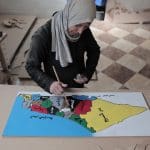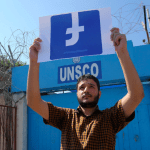
From invasive surveillance systems to social media censorship, Israeli violations of Palestinians’ digital rights have increased, especially since the 2021 Unity Intifada and the rise in global solidarity with Palestinians. Which local, regional, and global factors are impacting this troubling development? What role does Israel play in activating and circulating these repressive mechanisms? Are there positive aspects to these realities which could be employed in movement building?
Al-Shabaka policy analyst Nadim Nashif and digital rights activist Raya Sharbain joined us for a discussion with host Nadim Bawalsa about resisting the repression of digital rights in Palestine and beyond.
Nadim Bawalsa is Associate Editor with the Journal of Palestine Studies. From 2020-2023, Nadim served as Al-Shabaka’s commissioning editor. He is a historian of modern...
Al-Shabaka Policy Member Nadim Nashif is the executive director and co-founder of 7amleh: The Arab Center for the Advancement of Social Media. Nadim is a committed...













